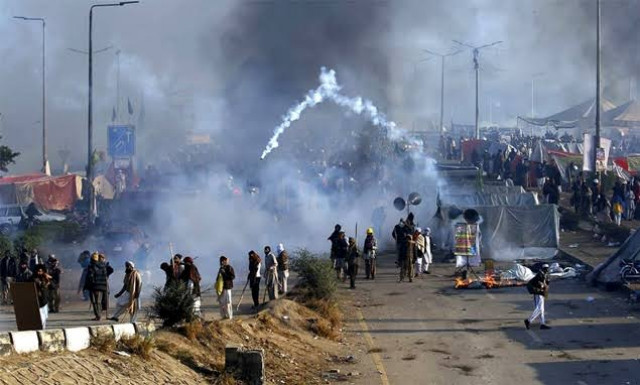Agencies given clean chit in Faizabad sit-in probe
Inquiry commission report says no-one accused agency officials of facilitating protesters in 2017

The Faizabad sit-in probe commission has given a clean chit to the spy agencies as well as former spymaster Lt Gen (retd) Faiz Hameed, stressing that high-ups of the then government did not accuse officials of the agencies of extending facilitation to Tehreek-e-Labbaik Pakistan (TLP) protestors in 2017.
Instead, the three-member commission held the political leadership, including the then Punjab chief minister – now the prime minister – Shehbaz Sharif, among others, responsible for letting the TLP protestors enter Islamabad without any resistance due to “apprehension of losing their vote bank”.
In November last year, the government formed a three-member commission to identify those who planned, financed, and supported a sit-in at the Faizabad area which disrupted lives in the twin cities Rawalpindi and Islamabad between November 6 and November 27, 2017.
In its report, which emerged on Tuesday, the commission observed that high-ups of former provincial and federal governments did not accuse the agencies or any other officials of facilitating the TLP protestors and that no such evidence was brought before it.
“Since no one including the former prime minister, former interior minister, former law minister, and former chief minister of Punjab, accused intelligence agencies or any other official of the agency for extending facilitation to the protestors nor other evidence was brought forward, therefore, the commission could not connect any organization or state official in supporting TLP to organise dharna.”
According to the report, then-Prime minister Shahid Khaqan Abbassi, Interior Minister Ahsan Iqbal, Law Minister Zahid Hamid, Punjab Chief Minister Shehbaz Sharif, and Intelligence Bureau (IB) chief Aftab Sultan were asked specifically about the alleged role of agencies in facilitating the march.
“They all denied the role of any organ or person of the state to have indulged in such an activity,” the report stated. It added that Iqbal told the commission that having no other alternative; the federal government used the services of the Inter-Services Intelligence (ISI) in order to reach out to the leadership of the TLP and sign an agreement that ended the protest.
It noted that Lt-Gen (retd) Faiz Hameed, who was a major general at that time, holding the post of director general (C) in the Inter-Services Intelligence (ISI) had to sign the agreement on the behalf of security establishment as a mediator between two parties with the permission of then ISI chief and then chief of army staff.
Based on the available record, the commission said, it appeared that the Faizabad sit-in was more due to lack of courage of conviction of the leader handling the issue and in particular the Punjab government, saying it is the reason both the provincial and federal governments dithered in tackling the issue at the initial stage.
The report also said that the record suggested different stances of the federal government and Punjab government to deal with the issue. While Abbasi initially persuaded the Punjab government to contain the protest in its limits, Chief Minister Shehbaz “advised to let them proceed to Islamabad”.
The commission was led by Syed Akhtar Ali Shah, a former civil servant, who also served as Khyber-Pakhtunkhwa’s police chief. It included Tahir Alam Khan, a former IG of ICT, and Khushal Khan, an additional secretary at the Ministry of Interior.
In its report spread over 149 pages, 57 annexures and sub-annexures and one appendix, the commission also highlighted a lack of coordination between Rawalpindi and Islamabad polices, as a result, seven people were killed and 277, including police and Frontier Constabulary officials were injured.
The report recommended that zero tolerance should be observed while dealing with violent extremism. It stated that countering terror financing fell within the domain of all those organs of the state, fighting against terrorism. “They have to work in unison,” the report recommended.
The report stressed the need for amending the Pakistan Electronic Media Regulatory Authority (Pemra) Act, regarding the composition of the council of complaints. It also said that laws and rules should be amended about the abuse of social media for illegal purposes.
It also called for giving the Islamabad Capital Territory (ICT) the status of a province to improve its effectiveness and efficiency. The commission suggested that there must be one force, the police, to deal with the issues of law and order.
The commission underscored the need for legislation, followed by rules and standing operating procedures to regulate the working of Intelligence agencies. It said that omission to implement the National Action Plan (NAP) would be considered as misconduct on the part of the officials concerned.
The commission observed that because of the supreme court ruling in the Mustafa Impex case – which says the government means cabinet -- the executive authority of the prime minister had been diluted. Therefore, the judgement might be re-visited, it added.



















COMMENTS
Comments are moderated and generally will be posted if they are on-topic and not abusive.
For more information, please see our Comments FAQ